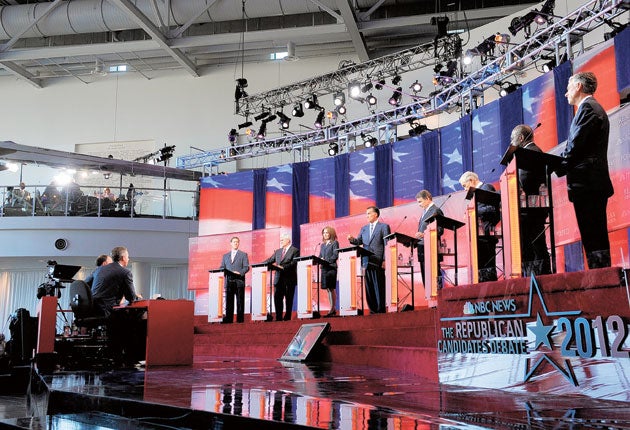Perry seizes mantle of Republican favourite in his first election debate
Rivals take aim at the new front-runner in feisty confrontation

Your support helps us to tell the story
From reproductive rights to climate change to Big Tech, The Independent is on the ground when the story is developing. Whether it's investigating the financials of Elon Musk's pro-Trump PAC or producing our latest documentary, 'The A Word', which shines a light on the American women fighting for reproductive rights, we know how important it is to parse out the facts from the messaging.
At such a critical moment in US history, we need reporters on the ground. Your donation allows us to keep sending journalists to speak to both sides of the story.
The Independent is trusted by Americans across the entire political spectrum. And unlike many other quality news outlets, we choose not to lock Americans out of our reporting and analysis with paywalls. We believe quality journalism should be available to everyone, paid for by those who can afford it.
Your support makes all the difference.Strapped by an economy teetering on a second recession and falling popularity numbers, President Barack Obama presented an urgent jobs creation package to members of Congress on Capitol Hill last night labelling it the 'American Jobs Act' and urging them in blunt terms to pass it "right away".
In a high-stakes gambit that he hopes will rekindle his already faltering hopes for re-election to a second term, Mr Obama challenged members – and in particular those in the Republican-controlled lower chamber – to lay aside the old games of partisan advantage and act on his plans or face the wrath of the nation.
"The question is whether, in the face of an ongoing national crisis, we can stop the political circus and actually do something to help the economy; whether we can restore some of the fairness and security that has defined this nation since our beginning," Mr Obama said according to pre-released excerpts.
Even before he spoke, the Republican leader in the US Senate, Mitch McConnell, snidely accused Mr Obama of merely replaying his past economic stimulus strategy that didn't work the first time around. "The definition of insanity... is to do the same thing over and over again and expect a different result." Some conservative Republicans had meanwhile threatened to boycott the speech entirely.
The plan was seen in some quarters as a hotchpotch of what should be mostly non-controversial policy initiatives some of which have received Republican support in the past, including an extension in a reduced rate of payroll tax, an injection of federal funds to begin a large-scale infrastructure programme to fix America's roads and bridges, other tax benefits and new funds for struggling local and state authorities.
Both parties know that as the 2012 election season heats up, unemployment is the single largest issue on the minds of voters. That Mr Obama chose to present his jobs plan last night to a rare joint session of the US Congress only underscored the political quick-sands he faces if the job numbers continue to deteriorate.
With the tabling of his plan, a new and deeply delicate pas-de-deux opens between him and Congress. While some Republicans will want instinctively to kill his plan at birth, they will know that doing so will allow him to charge them with obstructionism. Often their approval ratings are worse than his.
"There should be nothing controversial about this piece of legislation," Mr Obama said. "Everything in here is the kind of proposal that's been supported by both Democrats and Republicans – including many who sit here tonight. And everything in this bill will be paid for. Everything."
His plan, he said, "will create more jobs for construction workers, more jobs for teachers, more jobs for veterans, and more jobs for the long-term unemployed. It will provide a tax break for companies who hire new workers, and it will cut payroll taxes in half for every working American and every small business. It will provide a jolt to an economy that has stalled, and give companies confidence that if they invest and hire, there will be customers for their products and services. You should pass this jobs plan right away."
While the White House is loathe to put a figure on the package, all its elements may cost as much as $400bn (£250bn). That compares with the $787bn for the first Obama stimulus passed in early 2009. The money would have to be found by the bi-partisan super-committee that starts meeting this week to identify billions of budget cuts over the next decade.
After consulting with other Republican members on Capitol Hill, Mr Boehner did hint at possible compromise down the road. "What is it that we can agree on?" he said to reporters. "We know that the two parties aren't going to agree on everything. But the American people want us to find common ground and I'll be looking for it."
Join our commenting forum
Join thought-provoking conversations, follow other Independent readers and see their replies
Comments